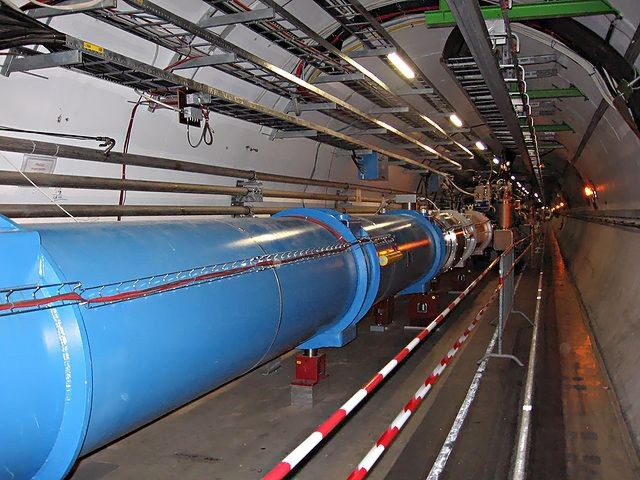Don?t Stick Your Hand In The Large Hadron Collider! [VIDEO]

What would happen if you stuck your hand in the Large Hadron Collider while it was turned on?
First of all, it would be pretty difficult to get anywhere near it -- the massive particle accelerator, which stimulates conditions that existed in the immediate aftermath of the Big Bang, is 328 feet underground and has security systems in place to keep out extremely foolhardy visitors. But hypothetically, if you could get past security and some very irate scientists and found the accelerator while it was turned on, you'd regret it really quickly, physicists say.
Videojournalist Brady Haran, whose Sixty Symbols series for the University of Nottingham provides an introduction to many core concepts in astronomy and physics, asked physicists working at the LHC to explain just how much force is packed into the accelerator.
The energy of the proton beam traveling around the LHC's 16.5 mile loop is like an aircraft carrier in motion, says physicist David Barney.
Though the energy of LHC's proton beam only goes up to a maximum of 4 teraelectronvolts -- about the equivalent energy of a flying mosquito -- that relatively small force is concentrated into a beam that's less than a millimeter wide, amplifying the force of the beam to titanic proportions.
Another LHC researcher, David Goldfarb, says in the video that other experiments have shown beams like the LHC's punching holes through sheets of metal. The soft tissue of a human hand would present much less resistance.
Barney says he doubts the beam would cause someone's hand to explode -- it would probably have the same effect as an intense laser.
But the bigger problem, besides any sudden holes punched through your hand, would be radiation. The proton beam is accompanied by a halo of other elementary particles -- electrons and muons -- that extends out quite far, Barney explains.
Your whole body would be irradiated. You'd die pretty quickly, Barney said.
While no one has been careless enough to get in the way of the particle beam thus far in the LHC's operations, the accelerator was briefly shut down in 2009 after a bird dropped a piece of bread on some of the LHC's outdoor components, causing parts of the machine to overheat. The LHC wasn't turned on at the time of the mysterious avian sabotage -- but if it had been running, the overheating would have triggered an automatic failsafe.
Watch the video below:
© Copyright IBTimes 2024. All rights reserved.





















